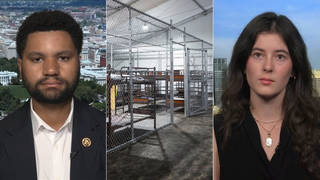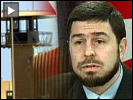
Lawyers for the Canadian torture and rendition victim Maher Arar are asking the Supreme Court to overturn a lower court ruling blocking him from suing the US government. In 2002, Arar was seized by US officials at Kennedy Airport in New York and rendered to Syria, where he was tortured, interrogated and detained in a tiny underground cell for nearly a year. Last year a federal appeals court ruled allowing the lawsuit to proceed would “offend the separation of powers and inhibit (US) foreign policy.” [includes rush transcript]
Transcript
AMY GOODMAN: Bill Quigley, finally, your center, the Center for Constitutional Rights, represents Maher Arar. He’s asking the Supreme Court to overturn a lower court ruling blocking him from suing the US government.
BILL QUIGLEY: Yes. This is another example of the courts failing to uphold their duty as a check or a balance to the actions of Congress or the administration. And the courts have said, look, maybe it’s true that this guy was kidnapped, maybe it’s true that he was rendered and he was tortured and held in a little underground burial spot for a year, and it’s true that he was innocent, but this is not something for the courts to get into, because this looks into sensitive issues of foreign policy, sensitive issues of secrecy. Well, that is just — it’s a green light for the government to do whatever they want, under whatever circumstances.
And this is a guy who was snatched by the United States government at JFK Airport in New York and sent to Syria. So, I mean, it’s not something that happened in another place. We took him off of a plane in JFK, that he was going to Canada, and gave him to the Syrians, sent him to Syria to be tortured for a year, because people thought he was a terrorist, which he wasn’t. And unless the Supreme Court rises and reasserts its role, the role of the courts to hold the government accountable, then this is immunity for John Ashcroft and Bush officials, and it is impunity of the kind that we criticize countries for around the world.
AMY GOODMAN: Bill Quigley, I want to thank you for being with us, legal director at the Center for Constitutional Rights, just recently back from Haiti.













Media Options